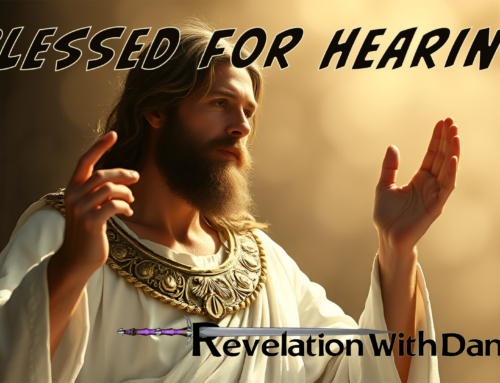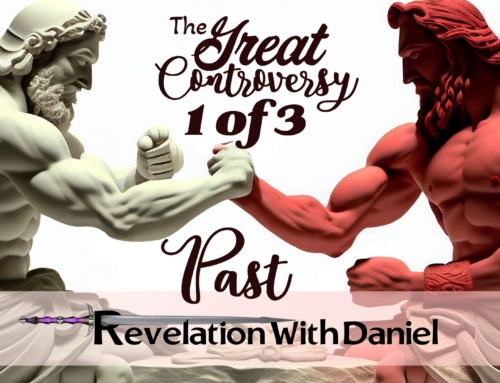Audio part 1:
Audio part 2:
 You posted an online series of videos and papers on the topic of the Godhead, along with a PDF called “50 Questions about the Trinity.” Give us the short version, what is your belief on the doctrine of the Trinity?
You posted an online series of videos and papers on the topic of the Godhead, along with a PDF called “50 Questions about the Trinity.” Give us the short version, what is your belief on the doctrine of the Trinity?
Without covering everything—due to the shortness of space—and taking all inspiration “as it reads” (GC 598.3), I believe “The Sovereign of the universe wa s not alone in His work of beneficence. He had an associate—a co-worker who could appreciate His purposes, and could share His joy in giving happiness to created beings. “In the beginning was the Word, and the Word was with God, and the Word was God. The same was in the beginning with God.” John 1:1, 2. Christ, the Word, the only begotten of God, was one with the eternal Father—one in nature, in character, in purpose—the only being that could enter into all the counsels and purposes of God. “His name shall be called Wonderful, Counselor, The mighty God, The everlasting Father, The Prince of Peace.” Isaiah 9:6. His “goings forth have been from of old, from everlasting.” Micah 5:2. And the Son of God declares concerning Himself: “The Lord possessed Me in the beginning of His way, before His works of old. I was set up from everlasting…. When He appointed the foundations of the earth: then I was by Him, as one brought up with Him: and I was daily His delight, rejoicing always before Him.” Proverbs 8:22-30” (PP 34.1).
The phrase “goings forth” in Micah 5:2 is used only one other time in the Bible. It’s translated “draught house” in 2 Kings 10:27. It’s referring to something set apart from the bigger thing (an outhouse set apart from the main house). This illustrates the same as does the stone cut out of the mountain without hands (Daniel 2:45)… Jesus, the chief corner Stone, said Himself, “My Father is greater than I” (John 14:28). (The word “greater” is translated “elder” in Romans 9:12.)
This same illustration is brought out in Adam and Eve:
- Genesis 1:26 – “When God said to His Son, “Let Us make man in Our image…” (EW 145.1) it equalled two—Adam and Eve. (The Spirit of God was IN all the fullness of humanity, just as it is with “the Spirit in all the fullness of the Godhead,” BTS March 1, 1906, par. 1-2) God breathed into Adam’s nostrils the breath of life, just as Christ breathed upon His disciples the breath of life, the Holy Ghost, in John 20:22.
-
- Romans 1:18-20 says what may be known is manifest in us, even God’s eternal power and Godhead:
-
- 2 sides of 1 brain – used together
- 2 ears – 1 hearing experience – used together
- 2 eyes – 1 seeing experience – used together
- 2 nostrils – 1 nose – used together
- 2 sides of 1 tongue – used together
- 2 sets of upper or lower teeth in 1 mouth – used together
- 2 vocal chords – used together
- 2 arms – used together
- 2 hands – used together
- 2 lungs – used together
- 2 kidneys – used together
- 2 lobes of the liver – used together
- 2 legs – used together
- 2 feet – used together
-
- Romans 1:18-20 says what may be known is manifest in us, even God’s eternal power and Godhead:
-
There are two that are OF the Godhead, not two that are IN the Godhead. Be sure to know the difference. “For it pleased the Father that in him should all fulness dwell” (Colossians 1:19).
- Genesis 2:7 – Adam, representing the “Father of all”, was first in existence (illustrating one with no beginning) (Psalm 90:1-2 which EGW apply applies to the Father, GC 479.2)
- Genesis 2:21-22 – Eve, representing the begotten Son, was brought forth from the side of Adam (Proverbs 8:22-30, Daniel 2:45, RH July 9, 1895, par. 13)
- Eve was from the man (Genesis 2:22, John 7:29, 8:42, 16:27-30, 17:8)
- Eve was made/formed from the substance of Adam (Genesis 2:22, Philippians 2:5-7)
- Eve was the glory of the man (1 Corinthians 11:7, John 17:5)
- Adam declared Eve as equal, ‘bone of my bones, flesh of my flesh’ (Genesis 2:23, John 5:18)
- Eve was a help meet (fit) for Adam (Genesis 2:20, Zechariah 6:13)
- Even was “the only being” that would be good for Adam (Genesis 2:20-24, PP 34.1)
- Adam gave her a name (Genesis 2:23, Hebrews 1:4-8)
- Adam, as most men are, was taller (John 14:28)
- Adam and Eve were “one” (Genesis 2:24, John 10:30)
- Compared to the others around them, they were “little short of being identical” (Genesis 2:23, YI December 16, 1897, par. 5)
Proverbs 8:22-30 is specifically used by the Messenger of the Lord as referring to Christ—“the only begotten of God.” Many will say this is referring to wisdom, but notice 1 Corinthians 1:24 and 30: “Unto them which are called, both Jews and Greeks, Christ the power of God, and the wisdom of God.” “But of him are ye in Christ Jesus, who of God is made unto us wisdom, and righteousness, and sanctification, and redemption.”
There is an extremely important point to understand in this concept; EGW uses the terms “from eternity” and “from everlasting” differently than “through everlasting” or “throughout eternity,” etc. “From eternity” Christ has existed with the Father, but we do not have statements saying Christ was with the Father “throughout eternity.” Through or throughout eternity is always used in a future tense. For example, “In speaking of His pre-existence, Christ carries the mind back through dateless ages. He assures us that there never was a time when He was not in close fellowship with the eternal God. He to whose voice the Jews were then listening had been with God as one brought up with Him” (ST August 29, 1900, par. 15). EGW first off closes this paragraph by quoting Proverbs 8:30, and could have easily said that Christ has always existed, but we cannot find that kind of language. She does not say there was never a time where He did not exist, she wrote about when He was not in close fellowship—different things. We could say that there was never a time when Eve was not in close fellowship with Adam (before she disobeyed), but we could never say that about Adam. In the same way, Ellen White did say that about the Son, but never said that about the Father.
In Genesis 16:1-4, Ishmael was used to “obscure” the “fact” of Isaac being the only begotten Son (Hebrews 11:17), just as it was with the fallen angels, “This fact the angels would obscure, that Christ was the only begotten Son of God…” (Lt42-1910.3).
Certainly, Christ was not created. “A complete offering has been made; for “God so loved the world, that he gave his only–begotten Son,”—not a son by creation, as were the angels, nor a son by adoption, as is the forgiven sinner, but a Son begotten in the express image of the Father’s person, and in all the brightness of his majesty and glory, one equal with God in authority, dignity, and divine perfection. In him dwelt all the fullness of the Godhead bodily” (ST May 30, 1895, par. 3).
This is how Christ was equal and authoritative, “God is the Father of Christ; Christ is the Son of God. To Christ has been given an exalted position. He has been made equal with the Father. All the counsels of God are opened to His Son” (8T 268.3). It would seem logical that there was a time when Christ didn’t have an exalted position, and that He was not equal with the Father—because He was begotten of God.
Now, regarding the Comforter: there are only five times the Bible uses the Greek word for “Comforter” first found in John 14:16. There are four times in John, and once in 1 John 2:1. The last time the word is used a name is given to the “Comforter” translated “Advocate,” which is “Jesus Christ the righteous.” This is how Ellen White felt so free is saying things like the following:
“Christ is to be known by the blessed name of Comforter. “The Comforter,” said Christ to His disciples, “which is the Holy Ghost, whom the Father will send in My name, He shall teach you all things, and bring all things to your remembrance, whatsoever I have said unto you, Peace I leave with you, My peace I give unto you: not as the world giveth, give I unto you. Let not your heart be troubled, neither let it be afraid”” (Ms7-1902.10).
And, “While Jesus ministers in the sanctuary above, He is still by His Spirit the minister of the church on earth. He is withdrawn from the eye of sense, but His parting promise is fulfilled, “Lo, I am with you alway, even unto the end of the world.” Matthew 28:20. While He delegates His power to inferior ministers, His energizing presence is still with His church” (DA 166.2).
“Christ gave His representative, the third person of the Godhead, the Holy Spirit. This gift could not be excelled. The divine Spirit, converting, enlightening, sanctifying, would be His donation, because He would give all gifts in one” (Ms44-1898.11).
Many will say that it is not essential to study the Spirit because “silence is golden” (AA 52.1). I agree, and the context says that the “nature” of the Spirit is what we are to be silent on, not the who, and certainly not going beyond what inspiration has revealed. For example, “It is not essential for you to know and be able to define just what the Holy Spirit is. Christ tells us that the Holy Spirit is the Comforter, and the Comforter is the Holy Ghost, “the Spirit of truth, which the Father shall send in My name.” “I will pray the Father, and He shall give you another Comforter, that He may abide with you for ever; even the Spirit of truth; whom the world cannot receive, because it seeth Him not, neither knoweth Him: but ye know Him, for He dwelleth with you, and shall be in you” [John 14:16, 17]. This refers to the omnipresence of the Spirit of Christ, called the Comforter. Again Jesus says, “I have yet many things to say unto you, but ye cannot bear them now. Howbeit when He, the Spirit of truth is come, He will guide you into all truth” [John 16:12, 13]” (14MR 179.2).
It would be well for all to read the context of each of these statements: “Jesus comes to you as the Spirit of truth” (2MR 337.1), “Christ was the spirit of truth” (SW October 25, 1898, par. 2), “We want the Holy Spirit, which is Jesus Christ” (Lt66-1894.18), “After Christ’s ascension His enthronement in His mediatorial kingdom was signalized by the outpouring of the Holy Spirit. On the day of Pentecost the Spirit was given” (COL 118.3).
Notice how John 7:37-39 reads without the supplied word ‘given’, “In the last day, that great day of the feast, Jesus stood and cried, saying, If any man thirst, let him come unto me, and drink. 38 He that believeth on me, as the scripture hath said, out of his belly shall flow rivers of living water. 39 (But this spake he of the Spirit, which they that believe on him should receive: for the Holy Ghost was not yet ______; because that Jesus was not yet glorified.)”
Have you noticed John 14:23 lately? “Jesus answered and said unto him, If a man love me, he will keep my words: and my Father will love him, and we will come unto him, and make our abode with him.” This follows verse 10 which says, “the Father that dwelleth in me, he doeth the works.”
I have literally reams of papers to say about this, as the Bible and Ellen White speak very clearly about this topic—but that’s why I’ve created a series of the 307 Bible verses I found regarding the relationship between the Father and the Son (which of course includes the Spirit).
- Where does the word Trinity come from?
It is not a Biblical term. Much of its popularity can be traced back to a Roman-lead ecumenical gathering called the “Council of Nicea” in 325 AD (just four years after Rome established the Sunday law in 321).
The earliest in Christianity seems to be found here: “Though conservative in his worldview, Tertullian originated new theological concepts and advanced the development of early Church doctrine. He is perhaps most famous for being the first writer in Latin known to use the term trinity (Latin: trinitas). According to The Stanford Encyclopedia of Philosophy, “Tertullian’s trinity [is] not a triune God, but rather a triad or group of three, with God as the founding member“.[12] A similar word had been used earlier in Greek,[13] though Tertullian gives the oldest extant use of the terminology as later incorporated into the Nicene Creed at the 2nd Ecumenical Council, the First Council of Constantinople in 381 AD, or as the Athanasian Creed, or both.[14] Other Latin formulations that first appear in his work are “three persons, one substance” as the Latin “tres personae, una substantia” (itself from the Koine Greek “treis hypostases, homoousios“).[11] Influenced by Stoic philosophy, the “substance” of Tertullian, however, was a material substance that did not refer to a single God, but to the sharing of a portion of the substance of the Father (the only being who was fully God) with the Son and, through the Son, with the Holy Spirit.[12] He wrote his understanding of the three members of the trinity after becoming a Montanist.” https://en.wikipedia.org/wiki/Tertullian.
Also, there is a good historic resource in the second chapter of The Two Babylons or The Papal Worship by the late Alexander Hislop.
- Where does the word Godhead come from?
Acts 17:29, Romans 1:20, and Colossians 2:9, 2 Peter 1:3,4. These five uses are from three different but related Greek terms. (Strong’s Greek numbers 2304, 2305, and 2320.)
- Back in the 80’s I worked with an Apostolic Pentecostal contractor as a roofing subcontractor. They believed in Jesus only, that He was Father and Son and Holy Ghost all by Himself. Is that what you believe?
No. What you are describing sounds like Unitarianism (I accept the full deity of Christ). I suppose we could almost call this Modalism. Clearly the Father and the Son are not the same person. In regards to the Holy Spirit, I believe the Holy Spirit is the “third person of the Godhead,” one of the “three great powers of Heaven,” one of the “Heavenly trio,” etc. just as much as EGW says it! I believe the Spirit proceeds from the Father (John 15:26) and also that, “The Holy Spirit, which proceeds from the only begotten Son of God, binds the human agent, body, soul, and spirit, to the perfect, divine-human nature of Christ” (RH April 5, 1906, par. 16). I believe the Spirit was given in a special sense at Pentecost (Acts 2, Revelation 5:6), and we can see in John 14, 15, 16, and 17 that the coming Comforter is referred to as future tense. And I believe the Spirit is the omnipresence of the Spirit of Christ called the Comforter.
- In light of all the challenges that the church is currently facing, why go after the doctrine of the Trinity? Doesn’t that risk dividing conservative Adventists at a time when they need to be more unified than ever?
Why?
The Trinity:
– No real Son
– No real Father
– Jesus has two Fathers (Father and Holy Spirit and the LGBTQ+ community is right)
– The Father has two Sons (Jesus and the Holy Spirit which cries Abba Father)
– Two mediators in both the Son and the Spirit
– No Divine Sacrifice in that Christ did not really die (in that God cannot die)
– Jesus raised himself because as God He did not need his Father to raise Him
– Jesus could not have our fallen nature because God cannot be tempted
– Jesus could not have sinned because God cannot sin
– Jesus would be a liar in that he called His Father the only true God
– The Father is a Liar as He said that Jesus was His Son in whom He is well pleased
One True God of the Bible:
– A Real Father
– A Real Son who was truly begotten
– The Son has one Father
– The Son really died as a true divine sacrifice
– The Father through Angels and His Spirit raised Jesus from the dead
– There is only one mediator between God and men, the man Christ Jesus
– Jesus had a fallen nature yet never chose to sin, being born again
– Jesus could have sinned
– The Father is the one true God
– The Father told the truth when He said that Jesus was His Son in whom He is well pleased
These are two completely different Gods, one saves and the other cannot.
Just like everyone else, I don’t like to say it, but “Divisions will come in the church. Two parties will be developed. The wheat and tares grow up together for the harvest”
(Ms32-1896.34).
“Men would effect a union through conformity to popular opinions, through a compromise with the world. But truth is God’s basis for the unity of his people” (GW92 391.2). (See John 17:17)
- [My wife] and I enjoyed our time with you and [your wife] in San Antonio, and will always consider you friends. How will your new beliefs regarding the Godhead affect other friendships? Or will it?
Brother! I pray God’s truth never leads us to love people less! We sooo enjoyed our time with you too! And Thai food to boot! =) I don’t consider myself an “anti-trinitarian”, but rather, a “non-trinitarian.” It’s my choice through my own study, and I will teach and preach this as long as God continues to give me breath, but I want to love all of God’s people while doing it!
- I agree that the word trinity is not in the Bible, but the doctrine of the Godhead is certainly in there.
Truth… The question is, what does inspiration say about the identity of each of the “three powers of the Godhead”? And, is it appropriate to allow philosophical, non-biblical language to define who God is? For example, I don’t find “co-eternal,” “God the Son,” “God the Spirit,” and “God the Holy Spirit” when searching all of inspiration. I do find Ellen White use the word “trinity” one time in seventy years, but it had nothing to do with God.
One of which I think is the clearest sections of the Ellen White writings about the Godhead is found in these two paragraphs: “The Father can not be described by the things of earth. The Father IS all the fullness of the Godhead bodily, and is invisible to mortal sight. The Son IS all the fullness of the Godhead manifested. The word of God declares Him to be “the express image of His person.” “God so loved the world that He gave His only begotten Son, that whosoever believeth in Him should not perish, but have everlasting life.” Here is shown the personality of the Father (BTS March 1, 1906, par. 1)
“The Comforter that Christ promised to send after He ascended to heaven, is the Spirit IN all the fullness of the Godhead, making manifest the power of divine grace to all who receive and believe in Christ as a personal Saviour. There are three living persons of the heavenly trio. In the name of these three powers,—the Father, the Son, and the Holy Ghost, those who receive Christ by living faith are baptized, and these powers will cooperate with the obedient subjects of heaven in their efforts to live the new life in Christ” (BTS March 1, 1906, par. 2).
- At the baptism of Jesus, all three members of the Godhead show up (The Son, The Holy Spirit [dove] and The Father [voice]). Whether we call it trinity or the Godhead, there were three there, no?
Actually, no… (huuuhh?) Notice what EGW says about that time of critical history: “Never had angels listened to such a prayer. They were solicitous to bear to the praying Redeemer messages of assurance and love. But no; the Father himself will minister to his Son. Direct from the throne proceeded the light of the glory of God. The heavens were opened, and beams of light and glory proceeded therefrom and assumed the form of a dove, in appearance like burnished gold. The dove-like form was emblematical of the meekness and gentleness of Christ” (YI March 1, 1874, par. 4).
Is this saying the dove was an emblem? Yup. It represented the Spirit of God the Father which proceeded from the throne. It’s in concert with John 15:26, “When the Comforter is come, whom I will send unto you from the Father, even the Spirit of truth, which proceedeth from the Father, he shall testify of me.”
Please notice Romans 1:22-23, “Professing themselves to be wise, they became fools 23 And changed the glory of the uncorruptible God into an image made like to corruptible man, and to birds, and fourfooted beasts, and creeping things.”
- If everyone in the church changes their minds and rejects the trinity, would that make us more righteous?
“Open ye the gates, that the righteous nation which keepeth the truth may enter in” (Isaiah 26:2). Simply put, the wrong god will give us the wrong righteousness. Does the last call to the world say, “Fear gods and give glory to them?” Jesus said there is one true God, meaning His Father (see John 17:3). If we are looking for “His Father’s name” to be in our foreheads (Revelation 14:1), wouldn’t it make sense that we believe that the Father has a Son? (John 3:16).
“Sin is the transgression of the law” (1 John 3:4). The opposite of sin is righteousness, or keeping of the law. This can be accomplished only by the Spirit of Christ living in us. Our allowing of His Spirit to dwell in our minds shows our love to God, as Jesus said, “If ye love me, keep my commandments” (John 14:15).
“And this is his commandment, That we should believe on the name of his Son Jesus Christ, and love one another, as he gave us commandment. And he that keepeth his commandments dwelleth in him, and he in him. And hereby we know that he abideth in us, by the Spirit which he hath given us” (1 John 3:23-24).
Jesus said there is one true God, with Himself as His Son (John 17:3).
Paul said there is one God and Father of all (1 Corinthians 8:6, Ephesians 4:6).
Paul taught this to Timothy (1 Timothy 2:5).
James said the fallen angels believe there is one God with a Son (James 2:19).
The demons know that Jesus is the Son of God most high (Luke 8:28).
The scribes knew there was one God, which brought commendation from Christ (Mark 12:32-34).
Malachi said there was one God who created us—through His Son (Malachi 2:10).
Moses agreed, laying the foundation many years before (Deuteronomy 6:4).
What should our church say?
- Do you see yourself as a reformer?
More like a “repairer of the breach” (Isaiah 58:12). After all, which is more important, the Sabbath or the God of the Sabbath? (See Ezekiel 20:12, 20) Ellen White predicted that the fundamental principles from the last 50 years would be counted as error (from approximately 1853-1903). (Consider looking at the phrases, “last fifty years” and “past fifty years” in EGW’s writings.)
“The enemy of souls has sought to bring in the supposition that a great reformation was to take place among Seventh-day Adventists, and that this reformation would consist in giving up the doctrines which stand as the pillars of our faith and engaging in a process of reorganization. Were this reformation to take place, what would result? The principles of truth that God in His wisdom has given to the remnant church would be discarded. Our religion would be changed. The fundamental principles that have sustained the work for the last fifty years would be accounted as error. A new organization would be established. Books of a new order would be written. A system of intellectual philosophy would be introduced. The founders of this system would go into the cities and do a wonderful work. The Sabbath, of course, would be lightly regarded, as also the God who created it. Nothing would be allowed to stand in the way of the new movement. The leaders would teach that virtue is better than vice; but God being removed, they would place their dependence on human power, which, without God, is worthless. Their foundation would be built on the sand, and storm and tempest would sweep away the structure” (Lt242-1903.13).
Believe it or not, some of the pillars, along with the sanctuary, are the personality of God or of Christ. “Those who seek to remove the old landmarks are not holding fast; they are not remembering how they have received and heard. Those who try to bring in theories that would remove the pillars of our faith concerning the sanctuary, or concerning the personality of God or of Christ, are working as blind men. They are seeking to bring in uncertainties and to set the people of God adrift, without an anchor” (Ms62-1905.14).
- How does this new belief make you a better father or husband?
“For if a man know not how to rule his own house, how shall he take care of the church of God?” (1 Timothy 3:5). “The man who does not know God as his Father, and Jesus Christ as the only begotten Son of the infinite God, cannot rule wisely” (17MR 318.4). How can I properly and responsibly lead my family if I don’t walk in God’s way, if I compromise on something as vitally important as the Godhead?! It involves the first tablet of the 10 Commandments. It includes the 3 Angels’ Message. This truth makes me realize that I should be willing to sacrifice in my marriage for my wife and children, like Christ has done for me.
My father was alcoholic. He didn’t give me a good example of life when growing up. Now that I actually know there is a real Father in Heaven, it has brought me to tears numerous times while contemplating the love He has for us! He gave His Son who gave Himself both physically AND spiritually! We are told that John 3:16 tells of the person and the personality of the Father in Heaven (See BTS March 1, 1906, par. 1).
One thing I have learned much more about is love—real love. I pray continually that will be reflected to my family and those I interact with.
- If the church doesn’t accept the anti-trinitarian perspective, will you stay with the church and support it?
As long as I am allowed to teach the truth about the Father, the Son, and their Spirit I will stay in the church and support it. Most likely though, based on the example of others, I will be disfellowshipped at some point. I do pray the church will reform. I also hope the church takes heed of John 7:51, “Doth our law judge any man, before it hear him, and know what he doeth?”
- Any parting words?
Thank you for asking me to respond in this way.
If the church does not understand who God is, everything else will be amiss as well. The church must (re)consider this. A true understanding and appreciation of the Godhead might just lead to the breakthrough we all have been praying for—even the outpouring of the latter rain—that we need to get out of this gridlock we are in. Let’s study and pray like we have never before.
And, “If this counsel or this work be of men, it will come to nought” (Acts 5:38).







Leave A Comment